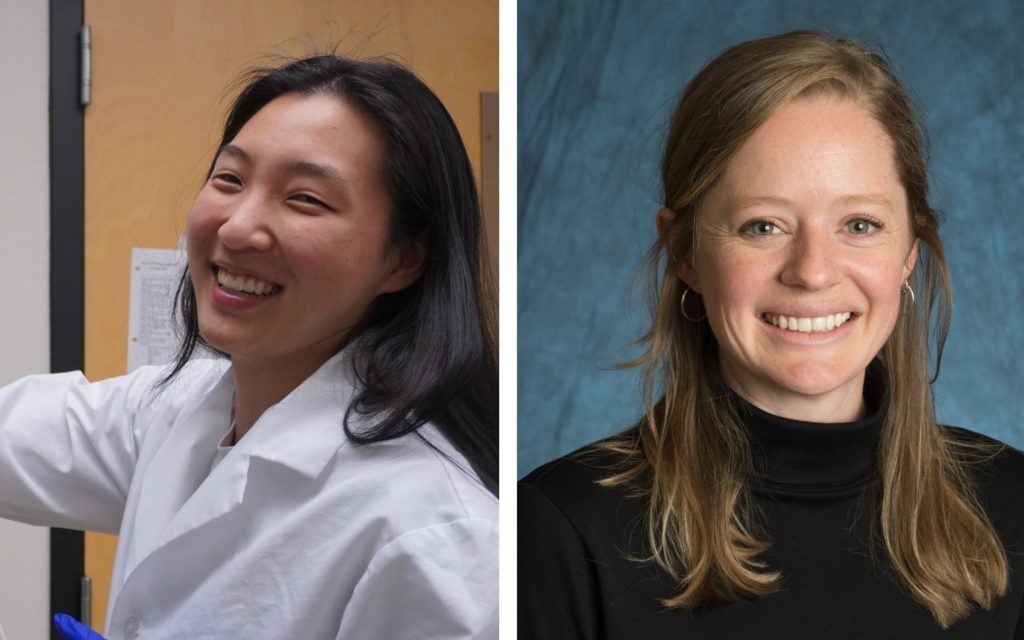
Annika Weber and Sylvia Lee, graduate students in the Department of Food Science and Human Nutrition at Colorado State University, are heavily invested in extending human life and enhancing health. They are armed with a deep understanding of how nutrition affects everyone differently, the negative effects of malnutrition, and which overlooked foods might be surprisingly crucial to our gut health.
Both Weber and Lee have been chosen as Fellows by the Vice President for Research Office, a prestigious distinction designed to support excellence and interdisciplinary cooperation in graduate research. VPR Fellows are eligible for scholarship and travel support funding, as well as professional development, networking, and mentorship. The two students were selected following top reviews for their presentations in the VPR-sponsored 3 Minute Challenge.
“We are incredibly proud of Annika and Sylvia, as well as the other VPR Fellows from our college,” said Lise Youngblade, dean of the College of Health and Human Sciences. “Students play such a key role in research, discovery, and sharing findings with the people who can directly benefit from their insights.”
Weber’s path to CSU
Hailing from Tucson, Arizona, Weber headed to the West Coast to study biochemistry and molecular biology at California Lutheran University. During her undergraduate studies, Weber gained experience at an environmental health laboratory that focused on the effects of exposure to certain chemicals, specifically farmers who have been exposed to pesticides. Weber’s interests in toxicology and research were sparked.
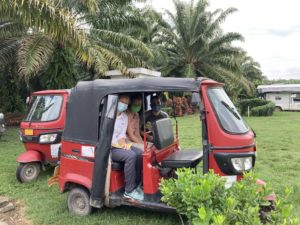
Weber also participated in an International Research Experience for Undergraduates program, where she worked in a lab in Dublin, Ireland. The international experience inspired her to accept a teaching position in Madrid, Spain, where she lived for two years teaching English to young children.
“It was a fun hiatus, and I loved working with kids, but also realized that I missed research,” said Weber.
She returned to school and completed her master’s degree at the University of Sheffield in England. Sheffield was a town embedded in the steel industry, and Weber saw an opportunity to lead a research project in community gardens there, analyzing heavy metal contaminants lingering beyond the steel industry growth in the industrial revolution through the 20th century.
It was this project that propelled Weber onto the Ph.D. track, where she found Elizabeth Ryan’s Nutrition and Toxicology Lab at CSU. Ryan’s work may be housed in the Department of Environmental and Radiological Health Sciences in CSU’s College of Veterinary Medicine and Biomedical Sciences, but its multi-disciplinary approach attracts students from a variety of fields. In particular, the lab investigates the impact of nutrient dense, fiber-rich foods on gut microbiome metabolism with health outcomes related to child growth as well as reducing risk for cancer. Weber’s interests aligned, and her timing was perfect: Ryan needed a doctoral student, so Weber made her way to Fort Collins.
Weber’s research
Weber’s research inspects the microbiota within a host organism, its responses to nutrient-dense foods, the health outcomes associated with those responses, and food safety in general. In her 3 Minute Challenge presentation, she focused on microbiota within the human gut, and how rice bran causes changes in the gut that can help prevent enteric diseases, which result from consuming contaminated food or water.
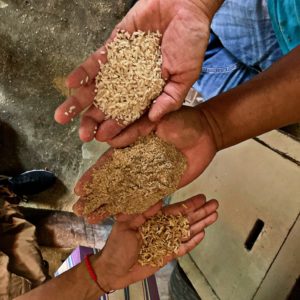
Rice bran is often sloughed off the rice, as most of the world prefers white rice. This removal blocks the potential benefits rice bran can have on gut health.
“Rice is produced in more than half the countries around the world, making readily available,” Weber said. “This means that rice bran could be incorporated back into human food systems and provide a local healthy food ingredient.”
Weber and her research team are applying this knowledge to a clinical trial in Indonesia, where over two million children suffer from malnutrition. The team will be using rice bran in foods purposed for malnutrition treatment, hoping to improve the effectiveness of the treatment by targeting the gut microbiome.
“The problem with current malnutrition treatment foods is that, while they have been very helpful in lowering mortality due to malnutrition, they don’t restore the gut microbiome, and recovered children are often left susceptible to diarrheal disease, malnutrition relapse, and chronic disease later in life,” said Weber. “We therefore hypothesize that rice bran will help promote the growth of native commensal gut microbes in these children recovering from malnutrition, which will help strengthen their immune strength and lower their risk of diarrheal diseases and malnutrition relapse.”
Weber plans to travel to Indonesia in the summer of 2022 to work with a local university to implement the treatment with rice bran.
“Our goal is also that the rice bran used in these therapeutic foods will eventually be locally sourced, as Indonesia is one of the biggest producers of rice in the world,” Weber said.
Weber’s three-minute presentation
Weber’s presentation, titled “Improving Health Outcomes with Prebiotics,” was re-written several times before she met the three-minute time limit, and was satisfied with her content at the same time.

“The best practice was rehearsing it for my family and husband who don’t work in this field and using their feedback on whether my research made sense to them,” said Weber. “It’s easy to get caught up in your own world of research, so this was a great way to practice communicating with various audiences and engaging people that maybe aren’t familiar with your topic of interest.”
Weber added: “I dedicated a lot of time to this presentation and kept practicing and revising to tell an engaging story, while also trying to not oversimplify the complexity of this research.”
On being named a VPR Fellow
Weber’s winning presentation has landed her in an elite group of researchers. VPR Fellows benefit from connections and mentorship that can help open doors.
“I feel very grateful to have been named a VPR fellow!” she said. “I’m excited to be part of this program and connect with the other Ph.D. students.”
What’s next for Weber
The field of gut microbiome research is growing exponentially, perhaps because awareness of the importance of gut health is growing beyond the lab. News headlines and healthcare practitioners share the importance of gut has on overall health, well-being, and longevity. This growth spells good news for Weber, who plans to continue examining diet-to-gut microbiome relationships and how this relationship can relate to disease prevention.
“It’s incredible how much the field has grown and how much new information has come out even in just the last couple of years. It’s very exciting!” Weber said.
Weber still plans to extend her research to an international level, reaching populations around the world who would benefit the most from her work.
“In particular, I hope to keep working in the field of gut-targeted nutrition interventions for disease prevention, especially in the prevention of diarrheal diseases that affect so many children around the world,” said Weber.
Lee’s research
Originally from Los Angeles, California, Lee completed her undergraduate degree in biology at the University of California San Diego. From there, she began research at the Scripps Institution of Oceanography in the Coastal Ocean Observing Lab, studying phytoplankton ecology and recording ocean temperature and salinity.
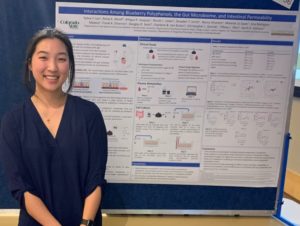
During her time at this lab, Lee realized that marine biology was not the path she wanted to follow throughout her career, so she began work in the UCSD Department of Orthopedic Surgery’s Muscle Biology Lab. There, while studying skeletal muscle and type II diabetes, Lee realized her passion for nutrition science, especially as it pertains to age.
“I loved how the research had the potential to help everyone since everybody eats and everybody ages,” said Lee. “I also realized that I wanted to work with humans since clinical research can more closely relate to feasible dietary interventions.”
The love for her research is what brought Lee to the Functional Foods for Human Health Lab at CSU, where she’s currently examining blueberries’ potential in reducing the incidence of cardiovascular disease, known as CVD, particularly in postmenopausal women with elevated blood pressure or stage 1 hypertension.
One might wonder how blueberries, such a seemingly simple fruit, could be linked to such powerful health improvements. According to Lee’s research, the ordinary blueberry is rich in plant molecules that have been associated with reduced cardiovascular disease incidence, and, it is one of the most popular berries in the U.S.
“The financial and emotional burden of CVD is immense, especially in the U.S., so treatment before cardiovascular events like heart attacks and strokes occur is important,” Lee said. “However, there is limited evidence supporting the efficacy of pharmaceuticals in the prevention of CVD in people who have not previously experienced an event. These factors and the rising interest in the use of natural products to promote health led us to study blueberries.”
Postmenopausal women especially need protection from CVD, as the risk for CVD dramatically increases during the menopausal transition.
Like Weber, Lee is particularly interested in the gut microbiome, and the role it plays in delivering the cardiovascular benefits of the blueberry.
Lee’s three-minute presentation
Lee’s presentation, titled “Interactions Among Blueberry Polyphenols, the Gut Microbiome, and Intestinal Permeability,” covers a wide range of research, making it incredibly difficult to condense into a three-minute presentation. One of the biggest challenges was re-thinking the way she needed to communicate, like explaining things she wouldn’t normally need to explain.
“With the help of my adviser Dr. Sarah Johnson and Dr. Chris Gentile, another faculty member in the department, I was able to really focus on telling a story and making sure the background information in my presentation was easy to understand,” said Lee. “We realized that the methodology was less important to the storytelling and that the focus of the presentation should be the background and the impact of the research.”
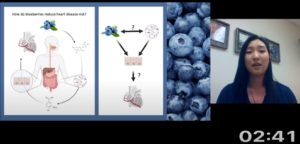
On being named a VPR Fellow
Lee has clearly demonstrated a great deal of growth and an increased understanding of the scientific community throughout her academic journey.
“If you told me a few years ago that I would participate in, let alone win, a speaking competition, I wouldn’t have believed you,” said Lee.
“I’ve been pushing myself outside of my comfort zone these past few years to do more oral presentations and public speaking because I believe it is super important as a scientist to be able to communicate effectively with anyone I come across,” Lee said. “It is a nice validation that my hard work is paying off.”
What’s next for Lee
The next few years look quite straightforward for Lee as she continues her graduate research to earn her Ph.D.
“I’m planning on graduating from my master’s program this spring and continuing to work in the Department of Food Science and Human Nutrition with Dr. Johnson on a Ph.D. starting in the fall,” said Lee. “I’m excited to see where research takes me!”
Additional VPR Fellows in the College
“The VPR Fellows program fosters emerging scientists who are just beginning to make a difference in our world through their passions and knowledge-sharing,” said Youngblade. “We are proud to have so many of our graduate students recognized by this program, and eager to celebrate future successes with them as their careers progress.” Learn more about the other VPR Fellows from the Department of Health and Exercise Science and the School of Social Work.
The Department of Food Science and Human Nutrition is part of CSU’s College of Health and Human Sciences.